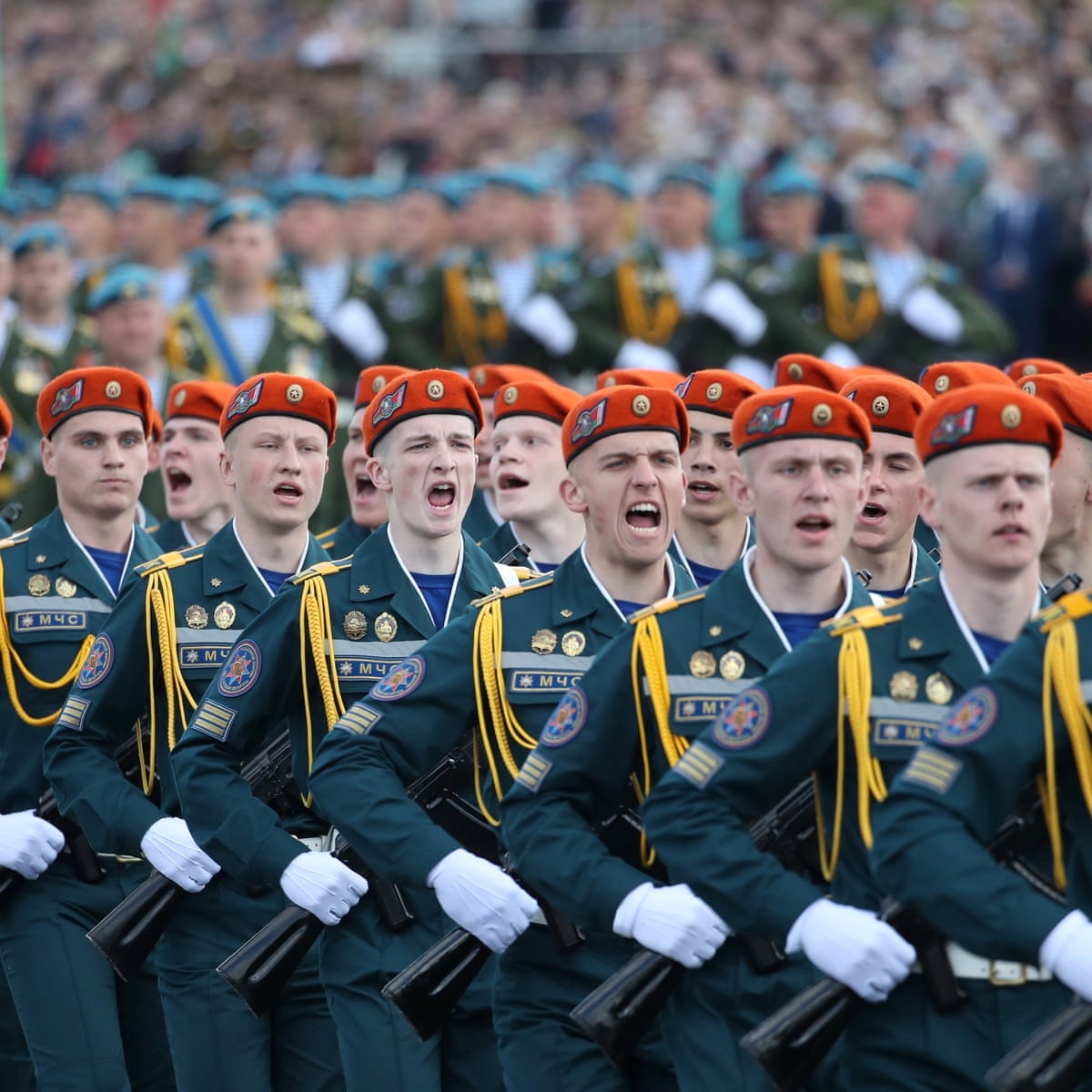
Two years ago, millions of Belarusians, tired of the authoritarian government of Alexander Lukashenko, voted for change. On 9 August 2020, millions of Belarusians went to the polls hoping for change. In many polling stations, Svetlana Tikhanovskaya received the majority of votes, but the dictator brutally suppressed the protests of those who believe the elections were rigged[1]. In 2020, Belarusians had no chance. Absolutely none. Because Putin’s Russia was already preparing for the big war[2].
2020 is a year of great fervour, political engagement, participation: there are new faces and the hope that something different is about to happen. But nothing has changed, except for the worse: those who had a new face and new ideas are in prison or have left the country. In Belarus there is no political activity, no protest. Lukashenko is safer than ever. The ‘three girls’ (Veronika Tsepkalo, Svetlana Tikhanovskaya and Maria Kolesnikova), symbols of the resistance, and who had managed to bring together far-flung groups, were the regime’s first targets[3].
Valeriy Tsepkalo (Veronika’s husband, a diplomat and former head of the Minsk Hi-Tech Park), who tried to run for office[4], left the country in July 2020, discovering that criminal proceedings had been opened against him for ‘corruption’. She now lives with her family in Latvia[5]. Maria Kolesnikova was sentenced to 11 years in prison, and is in a cell[6] (meanwhile, the KGB has put her and her colleague Maksim Znak on the terrorist list[7]). Only Svetlana Tikhanovskaya (in exile in Poland) continues to meet with world leaders[8] seeking help. Viktor Babariko is serving a 14-year sentence in a maximum security prison[9], and his son Eduard has been held in pre-trial detention for three years, without ever having been tried[10].
Internal divisions within the movement

May 2022: Veronika Tsepkalo and Svetlana Tikhanovskaya receive the Charlemagne Prize in Aachen[11]
But by now, opposition unity is a distant memory, as Valeriy Tsepkalo’s recent words on Tikhanovskaya announce: ‘She had a kind of mandate. It was to get the political prisoners released and call new elections. Well, we have waited two years and nothing has changed. Things are getting worse’[12]. An irrelevant statement, in a country where there is no press, no statistics, only the vicious repression of freedom. According to Tsepkalo, from August 2020 onwards, the members of the democratic movement have not been talking to each other: ‘Everyone has dispersed’, and the movement’s office is now the headquarters of Svetlana Tikhanovskaya, who tried to take part in the presidential elections[13]. Those who are excluded, because they are in prison or in exile, no longer have a voice[14].
Svetlana Tikhanovskaya decided on her own to call a general strike, not prepared by any organisation, and whose only result was the arrest of dozens of trade unionists[15]. She then negotiated with Lukashenko, and nothing came of it. She continues to meet with international politicians[16], appears in Western newspapers, but nothing changes in Belarus, and she keeps her strategy to herself[17]. The result is that Svetlana Tikhanovksya has one project[18], and the Organising Committee of the Conference of the Belarusian Forum of Democratic Forces, headed by Tsepkalo, has another, different one[19].
On 8 and 9 August, in Vilnius, Svetlana Tikhanovskaya organised the ‘New Belarus’ conference, which brought together the entire opposition – except Valeriy Tsepkalo[20]. His wife Veronika, in a resentful speech, accused Svetlana of a lack of transparency, of having created a ‘bot-farm’ that hates her and other activists, and complained that Tikhanovskaya’s representatives did not come to the Forum of Democratic Forces in Berlin, which had been organised by the Tsepkalo family[21]. Veronika thus became the main critic of Svetlana Tikhanovskaya[22], who, in response to the accusations[23], announced the formation of a Joint Transitional Cabinet for the next six months: a ‘collective executive body‘ of democratic forces that will have to ‘protect the sovereignty and independence of Belarus and ensure the transition from dictatorship to democracy‘[24].
Tikhanovskaya has appointed four ministers: Pavel Latushko (ex-diplomat and ex-director of the Kupalov Theatre[25]); Aleksandr Azarov, head of the BYPOL security association, appointed minister for restoring public order[26]; Valeriy Kovalevskyi, head of foreign affairs, ex-diplomat in the United States and ex-consultant for the World Bank[27]. But the main surprise is the appointment of Lieutenant Colonel of the Airborne Troops Reserve, the former general of the 38th Airborne Assault Brigade in Brest, Valeriy Sakhashchyk: he will be in charge of national security[28]. Analyst Aleksandr Klasskovski explains the decision as a mere stance against the Tsepkalo, which does not influence the situation in Belarus in any way[29].
The only functioning structure is BYPOL[30], an organisation made up of members of the Belarusian security services, which apparently collects ‘evidence of the crimes of the Lukashenko regime and conducts investigations into them’, and organises Peramoha, an underground popular militia[31]. All under the command of Tikhanovskaya.
As for relations with Russia, which the movement has long fantasised about, there are no tangible facts. Tsepkalo is the only Belarusian activist to have left the country not to go to Poland or the Baltic republics, but to Moscow – and he too was later forced to flee to Greece[32]: on the night of the presidential elections on 9 August 2020, he was near the Belarusian embassy in Moscow[33]. But none of the Russian officials wanted to talk to him, whereas they regularly receive leaders loyal to Lukashenko[34].
What is happening
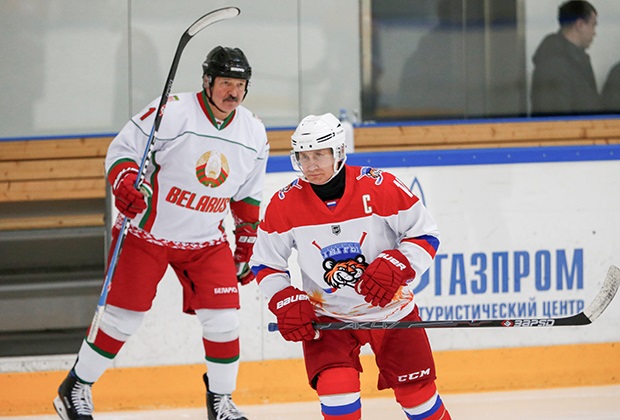
Putin and Lukashenko during a Night Hockey League game in Rosa Khutor, near Sochi[35]
Let’s start with the economy. It is falling apart. GDP has fallen 4.2% in six months and the process is accelerating. Experts see no reason for a quick recovery from the recession[36]: firstly, the regime is facing severe and long-lasting Western sanctions, which were decided in the face of the repression of protests[37]. Then, on 24 February 2022, Russia attacked Ukraine, and despite Lukashenko’s assurances, swearing that the Belarusian army was not involved, the international community considers Minsk complicit in Putin’s war crimes and, three days after the invasion, announced new sanctions affecting trade in oil products, tobacco, wood, cement and steel[38] (more than 120 pages of other specific products[39] and another 30 or so companies and individuals affected by the embargo[40]).
In addition, the Belarusian economy is in need of profound reform, as it is still governed in the Soviet manner: how can it grow? Lukashenko hates the word ‘reforms’, and only rarely conceded any improvements. But since the start of the protests, all that is over, and Lukashenko has started to attack the businessmen and IT workers who, according to him, have sold out to the West, but who are the country’s only real relevant imports[41]. Between 2014 and 2020, the EU had invested EUR 170 million in joint projects in environmental protection, customs and the energy sector: visa facilitation was negotiated and a student programme was organised. All this ended immediately after the 2020 elections[42].
Brussels denies Belarus access to EU financial markets, bans insurance and reinsurance contracts with Belarusian state enterprises and institutions, and has blocked payments from the European Investment Bank[43]. There is no point waiting for help from Moscow: Russia is also hard hit by the sanctions, and the only cooperation it is interested in is military cooperation[44].
But these are the easily measurable facts. The greatest damage, incalculable and invisible, is that caused by a repression that has been unknown since Stalin’s time, and which does not stop, because the regime’s paranoia does not yet believe it has flushed out all dissidents[45]. Tens of thousands of young people, who no longer see a perspective, have fled across the border: mostly educated, talented and modern people – a river that does not stop[46]. Lukashenko, on the other hand, is convinced that those in exile have repented: ‘My advice is to go home, repent and get down on your knees. Pay for the damage you have done, at least in part, because [to compensate] for what you have done, neither your property nor everything you have earned during your life will suffice’[47].
On the other hand, Belarusians who would like to leave the country continue to have problems with visas (the Czech Republic, Denmark, Estonia, Sweden and Finland have suspended the issuing of visas for Belarusians[48]), and the government in Minsk has closed their accounts abroad (several Belarusians living in Ukraine have reported the blocking of accounts in Ukrainian banks of Privatbank, FUIB, Ukrsibbank and Pivdenniy[49]). Paradoxically, many Belarusians who managed to leave the country are now starting to have problems, because Lukashenko supports Putin, and this triggers, especially in Ukraine, racist reactions: forced expulsions, difficulties in obtaining documents, threats, smashed car windows, refusal to rent accommodation, simply ‘because you are Belarussian‘[50].

Russian Wagner Group mercenaries arrest Belarusian citizens trying to leave the country[51]
Those living abroad and visiting relatives in Belarus risk being arrested by the security forces. Anyone who participated in the protests or supported them (by simply leaving the country) may be on the wanted list[52]. Crime is on the rise, but nobody cares, because the main task of the police is to suppress any protests, arresting as many critics of the regime as possible[53]: 35,000 people between the summers of 2020 and 2021, even more in the following year[54].
Political activity, if it is not to the liking of the regime, is forbidden and violently repressed: the country has been turned into one big open-air prison[55]. Opponents of the regime are treated like animals. The security forces mock them and beat them to a pulp. Political prisoners are subjected to hell, deprived of even the minimum that prisoners are entitled to[56]. At the end of July, 1264 people were recognised as political prisoners. Valeriy Tsepkalo proposed to buy back political prisoners from Lukashenko, especially women. According to some experts, Lukashenko might accept such a solution in exchange for sanctions relief – and the money, according to Tsepkalo, should come from those paid by the West to Svetlana Tikhanovskaya’s office[57].
On 21 July 2022, the law[58] introducing special proceedings (in absentia) in criminal trials against defendants outside Belarus came into force[59]. The head of the Investigative Committee explicitly states that one of the tasks of these courts is the confiscation of the property of politicians and activists who have left the country[60]. In this way, a trial is held without defence, turning critics of the regime into convicted criminals.
Among them are Svetlana Tikhanovskaya (the criminal trial against her was opened by the General Prosecutor’s Office in March 2022[61]), politicians Pavel Latushko and Volha Kovalkova, the chairman of the MTZ strike committee Siarhei Dyleuski and other influential people such as blogger Anton Motolko, anarchist Roman Khalilov, Valeriy Tsepkalo, members of Bypol, singer Angelika Agurbash, leaders of the Belarusian Sports Solidarity Foundation, Olympic athletes Alexandra Gerasimeni and Alexander Opeikin[62]. Everything that is truly Belarusian – from symbols to books – is mercilessly persecuted. The independent national media have been shut down[63] and Russian and pro-Russian propaganda reigns supreme[64]. A catastrophe: Belarus has slipped back into Stalinism and, in some ways, into the Middle Ages[65].
The border of fear
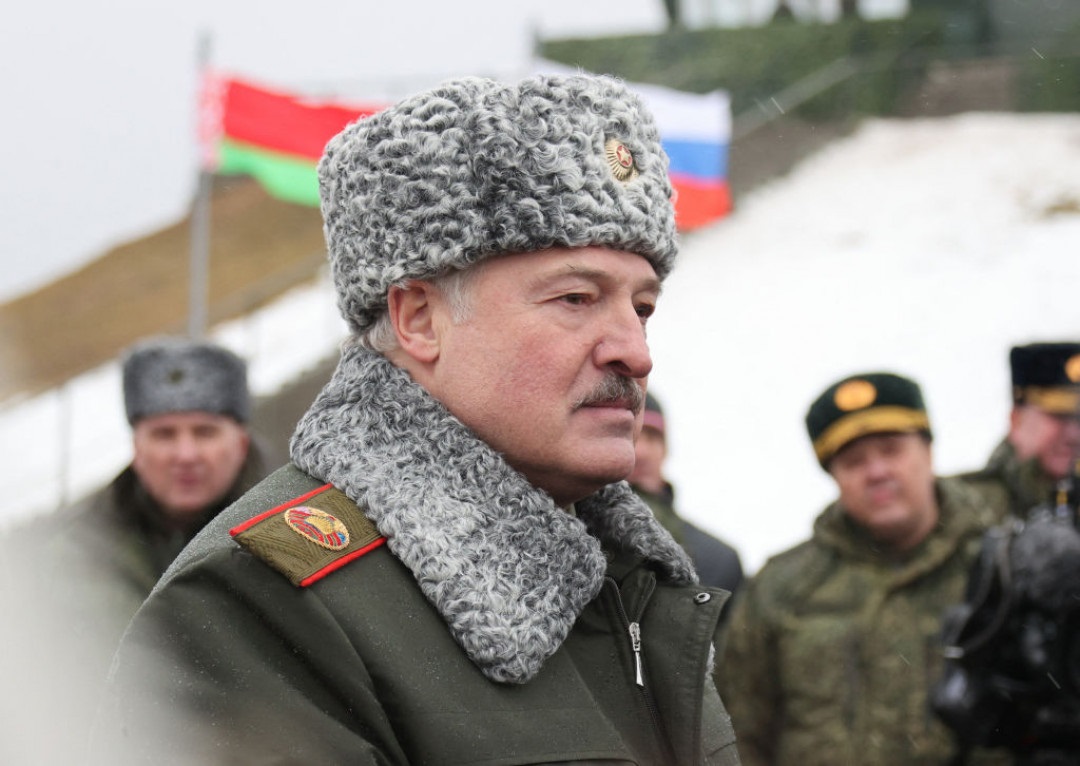
17 February 2022: five days before the invasion, Lukashenko inspects Belarusian troops at the border[66]
The length of the Belarusian-Ukrainian border is 1084 kilometres: on one side the regions of Gomel and Brest, on the other Volyn, Rivne, Kyiv and Chernihiv: a border undermined by the regime in Minsk, which has already strengthened its military presence on the border since 2014[67]. The Ukrainians are preparing for the worst, given the constant meetings between Putin and Lukashenko[68], the bombings that have hit the territory of Belarus[69] and Lukashenko’s declarations of full support for the invasion[70].
According to experts, Lukashenko does not want to fight (it is dangerous for him, and he wants to survive Putin[71]) and claims that he will only fire back if attacked[72]. Svetlana Tikhanovskaya, on the other hand, states that there are at least 1,500 Belarusians fighting against Russia, and many more will come later[73]. According to the Russian Ministry of Defence, 233 volunteers from Belarus have arrived in Ukraine since the beginning of the war. Of these, 85 have been ‘eliminated’ and 82 ‘have left’. As of 5 August, Moscow estimated the number of Belarusian volunteers at 66[74]. On 11 August, Ukraine placed two Belarusians on the list of prisoners to be exchanged; the Kalinovsky regiment considers them dead. According to the latest figures, 11 Belarusians were killed in Ukraine[75].
According to Ukrainian intelligence, Russia wants to provoke an attack on Belarus[76] by bombing Ukraine from Belarusian territory[77]. The first flights of Russian bombers that took off from Belarusian territory date back to 25 June[78]. In addition, the Russians have resumed using the Belarusian Iskander-M operational-tactical complexes. Moscow also uses Belarusian infrastructure (the Zyabrovka airport[79]) to transfer troops, deploy missiles and treat wounded soldiers[80].
For the Russian Federation, Belarus’ entry into the war could be crucial as it begins to deplete its forces. Lukashenko should cut off Ukraine’s supply routes and force part of Kiev’s army to move east. He does not care if the Belarusian army is defeated[81]. If provocations do not work, there is a risk that Russia will plan a terrorist attack on Belarusian territory (e.g. in Mozyr) and claim that the Ukrainians did it. A scenario used in Chechnya to ‘motivate’ Belarusians, who are not interested in a ‘special operation’ under the letter ‘Z’ to sacrifice their own lives and those of their children[82]. The propaganda plays the fanfare: from the border areas come reports of mass detentions, drone flights, military reinforcements, supplies of body bags, and constant appeals to the Belarusians not to enter the war[83].
The possible merger with Russia
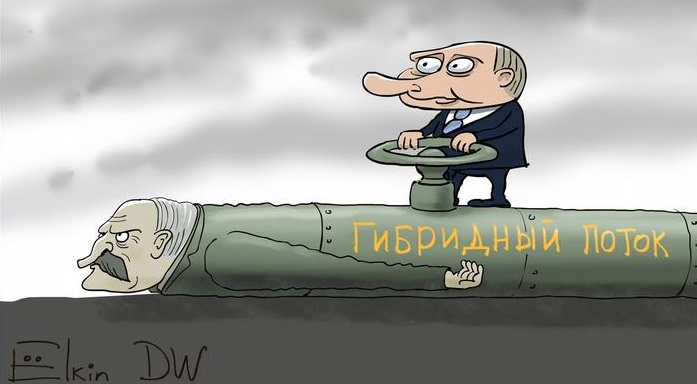
The influx of migrants at the Polish border is not enough for Lukashenko: he is now threatening to cut off gas transit to the EU[84], as in the cartoon by exiled cartoonist Sergei Elkin[85]
It is very difficult to say ‘no’ if you are 100% economically and politically dependent on Putin and have troops ready to go. When it became clear that the war would not end victoriously in a few days, Lukashenko realised that the invasion means nothing good for himself, his regime and the Belarusian economy[86]. According to opinion polls, the majority of Belarusian society is clearly against participation in the war. And it is very difficult to ignore this, even if one is a despot and autocrat[87]. The dictator knows very well that if he attacks, he will command Moscow afterwards. Lukashenko is the last obstacle on Putin’s path towards the creation of the Union State, signed in December 1999[88].
In January 2022, Russia and Belarus held an exercise called ‘Allied Resolve-2022’ (held this year on five polygons and four airfields) [89]. Unfortunately, the events of late February (as the US State Department did, ordering the families of embassy officials in Minsk to leave the country)[90]. Observer Artem Shraibman writes in an article for the Carnegie Moscow Center that “there has never been such a large number of Russian military personnel on Belarusian territory in the entire post-Soviet history“. NATO Secretary General Jens Stoltenberg estimated their number at 30,000. In addition, SU-35 fighters, SU-25SM attack aircraft, S-400 and Pantsir-S air defence systems, Iskander operational-tactical complexes and more were sent[91]. If the Belarusian army enters the war, it automatically becomes subordinate to the General Staff of the Russian Federation[92].
This is why Putin insists. There are major differences between Russia and Belarus, but if Lukashenko does not please Putin, no one can imagine his fate. If Lukashenko is promised in the West to remain as head of some council of state or nominal head of state, believe me, tomorrow the politics of Minsk will change in a heartbeat. And Lukashenko may try to push Russian troops out of Belarusian territory. But so far Lukashenko is worried about the economy. He has to bargain for discounts on oil and gas, the refinancing of old loans and logistical concessions: access to Russian ports, Russian import substitution programmes, state contracts, all things for which something must be offered in return: support for the war[93].
The ‘State of the Union’ project was born in the late 1990s and was signed by Boris Yeltsin and the young Lukashenko. Back then, integration did not envisage the creation of a unitary state, but only an alliance between two sovereign countries – but now, under the pressure of military intervention in Ukraine, things have changed[94]. In September 2021, after talks with Putin, the President of Belarus had to accept integration with Russia. As was said at the press conference, the issues of political integration and the single currency are on hold for the time being[95].
There are rumours about a possible referendum in September, in which the Belarusians would have to accept the merger with Russia, in parallel with similar referendums in the so-called republics of Lugansk, Donetsk and the other Ukrainian territories militarily controlled by the Russians[96]. It is important for Russia that Belarus remains an ally on the most sensitive western border, the one with NATO – a country that is not among those aspiring to join the European Union. This is a security issue, which is why Moscow cannot allow presidential elections to be held in Minsk in which a candidate who normalises relations with Western democracies wins.
Who runs, from where
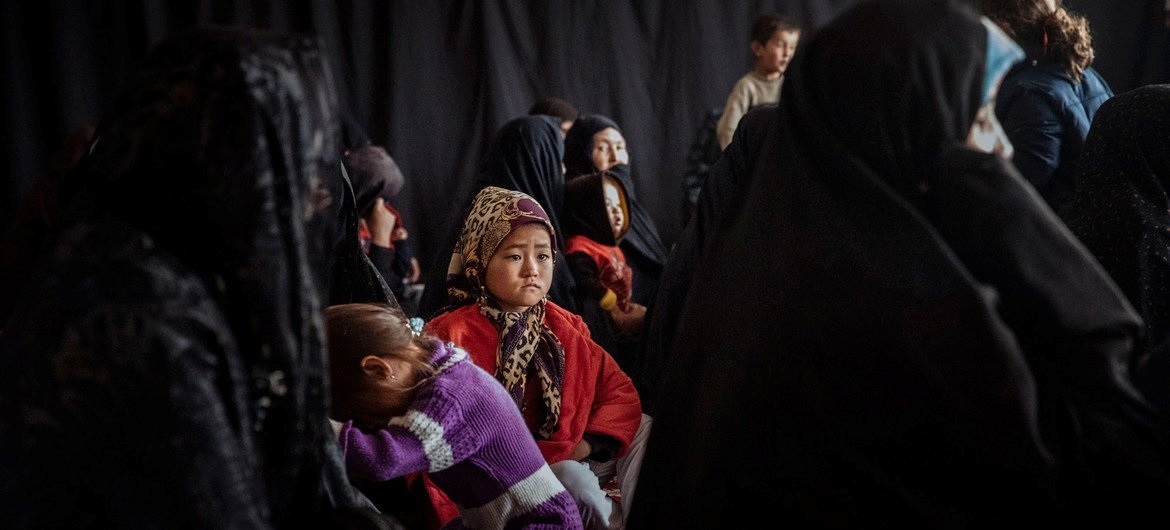
Migrants at the Polish border[97]
The migrant situation on the Polish-Belarusian border worsened at the beginning of November 2021. Numerous refugees, stranded in the countryside of Belarus, have been trying for weeks to cross the border into the European Union[98] – a 418-kilometre-long border, 186 kilometres of which are land. Warsaw built, at a cost of 366 million euro, some 60 kilometres of wall to prevent the migrants from entering[99]. The Polish Foreign Minister, Zbigniew Rau, claims that Lukashenko provoked the crisis with the support of Russia[100]. The European Union reacted immediately, and in early December new sanctions were introduced against 17 people and 11 companies involved in the transport of migrants (from Syria, Iraq and other African countries) to the Polish border: on the list is the Belarusian state airline Belavia, and also the Syrian state airline, Cham Wings, which earns money from Minsk based on migrants transported to Belarus[101].
At the end of March, Belarus reacted to the situation and closed one of the reception camps, ‘Bruzgi’, set up on the border with Poland for citizens of the Middle East: ‘All foreigners who were temporarily in the transport and logistics centre left it’. Some people have flown to Iraq, others are awaiting their return home in hotels and sanatoriums scattered across Belarusian territory. According to Interfax, there were about 400 migrants in the camp recently[102]. A necessary move, because with the Russian invasion, more than 40,000 Ukrainians entered Belarus and, from there, went to Poland[103], where more than 1.2 million people fleeing the war have applied for asylum[104]. The Polish parliament guarantees Ukrainian citizens access to the labour market and medical care, the right to education and other social benefits, in accordance with EU directives[105]. But it is the Polish people who make the greatest effort, because the majority of refugees are housed in private homes[106].
In this situation, the Polish people no longer have any pity for refugees from other war zones. The forced deportation of migrants arrested after entering Poland illegally, sent back to Belarusian soil, often takes place at night, to avoid detection by the Belarusian border guards. There are no exceptions: among these migrants there are often children and pregnant women[107]. The UN criticises this unequal treatment and the use of water cannons against non-Slavic migrants[108], and calls on Poland to review its legislation on migrants and to stop forced deportation[109].
At the same time, the Brussels Commissioner for Home Affairs, Ilva Johansson, who visited the Lithuanian-Belarusian border in January 2022, emphasises that the expulsion of migrants is illegal: ‘People have the right to seek asylum’. According to humanitarian organisations, about 8200 people have been deported to the Lithuanian-Belarus border alone[110]. For most of the migrants, the final target is Germany, which denounces the fact that in October alone 4900 migrants arrived from Belarus and Poland: all illegal immigrants caught by the German authorities had passports stamped by Belarusian border guards[111].
This is another profound lesson from the war in Ukraine. Vladimir Putin wants to prevent (for understandable reasons) all former allies of the Soviet Union years from becoming friends of the West and lining up to become European citizens. But this is an incontrovertible fact: the historical, ethnic, social, cultural and religious ties between the EU countries and the Slavs are very strong, and for us people from the East are part of our family of peoples.
That is why, if Putin moves the European border eastwards, he achieves an unexpected result: the population moves westwards en masse, starting with those who are the driving force of a nation: the skilled workers, the families with children, the intellectuals, the pacifists – all those who, rather than live in an increasingly North Korean-like dictatorship, running the risk of being arrested and tortured for nothing, or forced to take up arms against brotherly countries, prefer to risk their lives and flee – because they know very well where they will have a chance for a different and better life.
[1] https://ibiworld.eu/2020/09/10/ecco-le-tre-ragazze-che-potrebbero-salvare-la-bielorussia/ ; https://ibiworld.eu/2020/12/13/lo-strazio-degli-abbandonati-la-bielorussia-non-si-arrende-al-tiranno/
[2] https://www.the-village.me/village/city/whatsgoingon/292815-2-years
[3] https://ibiworld.eu/2020/09/10/ecco-le-tre-ragazze-che-potrebbero-salvare-la-bielorussia/
[4] https://ibiworld.eu/2020/09/10/ecco-le-tre-ragazze-che-potrebbero-salvare-la-bielorussia/ ; https://ibiworld.eu/2020/12/13/lo-strazio-degli-abbandonati-la-bielorussia-non-si-arrende-al-tiranno/
[5] https://news.zerkalo.io/economics/18759.html?tg
[6] https://news.zerkalo.io/life/19285.html?popular_desktop=
[7] https://lenta.ru/news/2022/05/24/kolesnikova/
[8] https://lenta.ru/news/2022/06/18/tihonovskaya/ ; https://lenta.ru/news/2022/03/26/biden_tikh/
[9] https://www.interfax.ru/world/776552
[10] https://www.the-village.me/village/city/city-interview/292703-ed-babariko
[11] https://www.dw.com/ru/veronika-cepkalo-my-sozdali-sovet-kotoryj-ocenivaet-kontent-nezavisimyh-smi/a-62755093
[12] https://news.zerkalo.io/economics/18759.html?tg
[13] https://lenta.ru/news/2022/07/28/tsepkalo/
[14] https://news.zerkalo.io/economics/18759.html?tg
[15] https://www.dw.com/ru/svetlana-tihanovskaja-objavila-obshhenacionalnuju-zabastovku-s-26-oktjabrja/a-55393650
[16] https://lenta.ru/news/2022/03/26/biden_tikh/ ; https://lenta.ru/news/2022/06/18/tihonovskaya/ ; https://tsikhanouskaya.org/ru/events/news/bde9c6d0998470b.html
[17] https://news.zerkalo.io/economics/18759.html?tg
[18] https://news.zerkalo.io/economics/13495.html
[19] https://belarusforum.org/ru/
[20] https://news.zerkalo.io/economics/19515.html?popular_desktop=
[21] https://www.dw.com/ru/perestante-rugatsja-ili-kak-oppozicija-belarusi-pytaetsja-obedinitsja/a-62750017
[22] https://www.dw.com/ru/veronika-cepkalo-my-sozdali-sovet-kotoryj-ocenivaet-kontent-nezavisimyh-smi/a-62755093
[23] https://tsikhanouskaya.org/ru/events/news/ee8158992ccbdac.html
[24] https://www.dw.com/ru/kabinet-tihanovskoj-kto-jeti-ljudi-i-smogut-li-oni-smestit-lukashenko/a-62771177
[25] https://www.dw.com/ru/pavel-latushko-kancler-angela-merkel-govorila-s-grazhdaninom-aleksandrom-lukashenko/a-59869355
[26] https://belsat.eu/ru/tag/aleksandr-azarov/ ; https://belsat.eu/ru/news/11-10-2021-byvshij-sledovatel-gubopik-azarov-o-tom-kak-eto-podrazdelenie-voyuet-s-belorusskim-narodom/
[27] https://kyky.org/hero/eks-sotrudnik-mida-kotoryy-dvazhdy-otsidel-v-tyurme-i-brosil-rabotu-v-vashingtone-tenevoy-ministr-tihanovskoy-kovalevskiy-dal-otkrovennoe-intervyu-kyky ; https://www.dw.com/ru/kabinet-tihanovskoj-kto-jeti-ljudi-i-smogut-li-oni-smestit-lukashenko/a-62771177
[28] https://www.dw.com/ru/kabinet-tihanovskoj-kto-jeti-ljudi-i-smogut-li-oni-smestit-lukashenko/a-62771177
[29] https://www.dw.com/ru/kabinet-tihanovskoj-kto-jeti-ljudi-i-smogut-li-oni-smestit-lukashenko/a-62771177
[30] Official web-site: https://bypol.org/en/
[31] https://news.zerkalo.io/economics/13495.html
[32] https://euroradio.fm/ru/semya-cepkalo-pereehala-iz-latvii-v-greciyu
[33] https://lenta.ru/articles/2021/09/10/putin_lukashenko/
[34] http://gaidukevichos.house.gov.by/ru/byography-ru/ ; https://lenta.ru/articles/2021/09/10/putin_lukashenko/
[35] https://lenta.ru/articles/2021/09/10/putin_lukashenko/
[36] https://money.onliner.by/2022/07/18/za-polgoda-vvp-belarusi-snizilsya-na-42
[37] https://charter97.org/ru/news/2020/8/14/389523/ ; https://tass.ru/mezhdunarodnaya-panorama/9204779?utm_source=ru.wikipedia.org&utm_medium=referral&utm_campaign=ru.wikipedia.org&utm_referrer=ru.wikipedia.org
[38] https://www.interfax.ru/business/824993 ; https://www.currenttime.tv/a/evrosoyuz-rasshiril-sanktsii-protiv-belarusi-iz-za-uchastiya-v-agressii-rossii-protiv-ukrainy/31732172.html
[39] https://www.dw.com/ru/sankcii-protiv-belarusi-za-vojnu-rf-v-ukraine-chto-zapretil-minsku-zapad/a-61002724 ; https://euneighbourseast.eu/ru/news/latest-news/repressii-v-belarusi-es-prinyal-novyj-paket-sankczij/ ; https://www.dw.com/ru/ssha-vveli-sankcii-protiv-belarusi-iz-za-sodejstvija-vtorzheniju-rf-v-ukrainu/a-60909144
[40] https://www.dw.com/ru/ssa-vvodat-vizovye-ogranicenia-protiv-100-dolznostnyh-lic-rezima-lukasenko/a-62760597
[41] https://ibiworld.eu/2020/09/10/ecco-le-tre-ragazze-che-potrebbero-salvare-la-bielorussia/
[42] https://www.dw.com/ru/ssa-vvodat-vizovye-ogranicenia-protiv-100-dolznostnyh-lic-rezima-lukasenko/a-62760597 diapositiva 16
[43] https://www.dw.com/ru/ssa-vvodat-vizovye-ogranicenia-protiv-100-dolznostnyh-lic-rezima-lukasenko/a-62760597 diapositiva 17
[44] https://www.the-village.me/village/city/news-city/292807-2-god-posle-vyborov
[45] https://www.dw.com/ru/boitsja-chto-ego-smetut-zachem-lukashenko-eshhe-bolshe-repressij/a-61605448
[46] https://www.the-village.me/village/city/news-city/292807-2-god-posle-vyborov
[47] https://www.youtube.com/watch?v=q8WPjKJdZeQ ; https://lenta.ru/news/2022/01/28/luka_oppoz/
[48] https://news.zerkalo.io/economics/15689.html?tg ; https://news.zerkalo.io/life/15230.html
[49] https://t.me/zerkalo_io/37655
[50] https://news.zerkalo.io/life/20038.html
[51] https://jamestown.org/program/russian-wagner-mercenaries-arrested-in-belarus/
[52] https://news.zerkalo.io/life/19290.html?popular_desktop=
[53] https://news.zerkalo.io/life/19290.html?popular_desktop=
[54] https://reliefweb.int/report/belarus/over-past-year-more-35000-people-have-been-arbitrarily-detained-belarus-special
[55] https://www.dw.com/ru/zachem-lukashenko-mstit-molodym-aktivnym-zhenshhinam/a-62487333
[56] https://www.the-village.me/village/city/news-city/292807-2-god-posle-vyborov
[57] https://www.dw.com/ru/torgovla-politzaklucennymi-opyt-gdr-dla-belarusi/a-62669026 ; https://www.dw.com/ru/valerij-cepkalo-vojna-v-ukraine-priblizhaet-pobedu-demsil-v-belarusi/a-61600142
[58] https://pravo.by/document/?guid=12551&p0=H12200199&p1=1&p5=0
[59] https://president.gov.by/ru/events/aleksandr-lukashenko-podpisal-zakon-ob-izmenenii-ugolovno-processualnogo-kodeksa-respubliki-belarus
[60] https://www.the-village.me/village/city/situation-city/292733-zaochnye-sudy?from=frontpage
[61] https://lenta.ru/news/2022/03/04/delo_tikhanovskaya/
[62] https://www.the-village.me/village/city/situation-city/292733-zaochnye-sudy?from=frontpage
[63] https://www.belta.by/society/view/shpilevskaja-nezavisimye-smi-v-belarusi-nuzhno-zaschischat-no-vnachale-pokazhite-mne-takoe-media-442481-2021/
[64] https://www.the-village.me/village/city/news-city/292807-2-god-posle-vyborov
[65] https://www.the-village.me/village/city/news-city/292807-2-god-posle-vyborov
[66] https://kyivindependent.com/regional/Does-Belarus-military-have-the-capacity-to-attack-Ukraine
[67] https://www.the-village.me/village/city/whatsgoingon/292723-chto-na-granice
[68] http://kremlin.ru/events/president/news/68460 ; https://www.rbc.ru/politics/25/06/2022/62b71c299a794707dde9ccda ; https://www.bbc.com/russian/news-60432491
[69] https://www.pravda.com.ua/rus/news/2022/07/2/7356018/
[70] https://www.interfax.ru/world/850177
[71] https://www.the-village.me/village/city/mind/292571-kak-belarus?from=newandbest
[72] https://www.pravda.com.ua/rus/news/2022/07/2/7356018/
[73] https://lenta.ru/news/2022/06/05/belowar/ ; https://www.corriere.it/economia/finanza/22_giugno_05/tikhanovskaya-le-sanzioni-minsk-vanno-tenute-rischio-repressione-piu-forte-29f6d020-e43a-11ec-8fa9-ec9f23b310cf.shtml
[74] https://news.zerkalo.io/life/19567.html
[75] https://news.zerkalo.io/life/19748.html
[76] https://www.facebook.com/photo/?fbid=340863681558392&set=a.230157752628986
[77] https://hromadske.ua/ru/posts/razvedka-raketnye-udary-s-territorii-belarusi-provokaciya-rossii-chtoby-zatyanut-belorusov-v-vojnu-protiv-ukrainy ; https://delo.ua/ru/politics/masstabnyi-raketnyi-obstrel-ukrainy-provokaciya-rossii-s-celyu-vtyagivaniya-belarusi-v-voinu-gur-400248/
[78] https://hromadske.ua/ru/posts/nochnye-obstrely-ukrainy-massovye-zapuski-raket-zafiksirovali-s-territorii-belarusi
[79] https://www.youtube.com/watch?v=GPmVbjWUzdo https://www.the-village.me/village/city/whatsgoingon/292723-chto-na-granice
[80] https://hromadske.ua/ru/posts/razvedka-raketnye-udary-s-territorii-belarusi-provokaciya-rossii-chtoby-zatyanut-belorusov-v-vojnu-protiv-ukrainy
[81] https://www.the-village.me/village/city/mind/292571-kak-belarus?from=newandbest
[82] https://www.the-village.me/village/city/mind/292571-kak-belarus?from=newandbest
[83] https://www.the-village.me/village/city/whatsgoingon/292723-chto-na-granice
[84] https://www.dw.com/ru/sankcii-protiv-belarusi-za-vojnu-rf-v-ukraine-chto-zapretil-minsku-zapad/a-61002724 ; https://newprospect.ru/authors/267/
[85] https://www.severreal.org/a/iz-rossii-uehal-izvestnyy-hudozhnik-sergey-yolkin/31801384.html
[86] https://www.the-village.me/village/city/mind/292571-kak-belarus?from=newandbest
[87] https://www.the-village.me/village/city/mind/292571-kak-belarus?from=newandbest
[89] https://www.dw.com/ru/fevralskie-voennye-uchenija-rossii-i-belarusi-chto-o-nih-izvestno-a-chto-net/a-60700969
[90] https://www.washingtonpost.com/national-security/2022/02/02/putin-belarus-ukraine/
[91] https://www.dw.com/ru/fevralskie-voennye-uchenija-rossii-i-belarusi-chto-o-nih-izvestno-a-chto-net/a-60700969
[92] https://www.the-village.me/village/city/mind/292571-kak-belarus?from=newandbest
[93] https://www.the-village.me/village/city/mind/292571-kak-belarus?from=newandbest
[94] https://lenta.ru/articles/2021/09/10/putin_lukashenko/
[95] https://lenta.ru/articles/2021/09/10/putin_lukashenko/
[96] https://www.corriere.it/economia/finanza/22_giugno_05/tikhanovskaya-le-sanzioni-minsk-vanno-tenute-rischio-repressione-piu-forte-29f6d020-e43a-11ec-8fa9-ec9f23b310cf.shtml
[97] https://news.un.org/ru/story/2021/09/1409442
[98] https://www.dw.com/ru/migranty-na-granice-belarusi-i-polshi-chto-mogut-sdelat-es-i-nato/a-59781718
[99] https://www.dw.com/ru/polsha-uzhe-postroila-60-kilometrov-zabora-na-granice-s-belarusju/a-61719015
[100] https://www.dw.com/ru/glava-mid-polshi-lukashenko-sprovociroval-krizis-pri-podderzhke-rf/a-60035806
[101] https://www.dw.com/ru/es-vvodit-sankcii-za-provoz-migrantov-cherez-belarus/a-59991026
[102] https://www.dw.com/ru/v-belarusi-zakryli-lager-dlja-migrantov-na-granice-s-polshej/a-61207856
[103] https://smartpress.by/news/26469/
[104] https://www.bbc.com/news/world-60555472
[105] https://news.un.org/ru/story/2022/07/1428612
[106] https://news.un.org/ru/story/2022/07/1428612
[107] https://www.belta.by/politics/view/vne-zavisimosti-ot-vremeni-sutok-i-pogodnyh-uslovij-spetsdokladchik-oon-o-tom-kak-vydvorjali-migrantov-515970-2022/
[108] https://www.belta.by/society/view/etot-instrument-absoljutno-neadekvaten-i-neproportsionalen-spetsdokladchik-oon-ob-ispolzovanii-polshej-515963-2022/
[109] https://www.belta.by/politics/view/spetsdokladchik-oon-prizval-polshu-peresmotret-svoe-zakonodatelstvo-v-otnoshenii-migrantov-515980-2022/ ; https://news.un.org/ru/story/2022/07/1428612
[110] https://www.dw.com/ru/evrokomissar-zajavila-o-dejeskalacii-na-granice-mezhdu-stranami-es-i-belarusju/a-60518912
[111] https://www.dw.com/ru/es-vvodit-sankcii-za-provoz-migrantov-cherez-belarus/a-59991026 , diapositiva 11 ; https://www.dw.com/ru/policija-frg-soobshhila-o-tysjachah-zaderzhannyh-na-granice-nelegalov/a-59688089
Leave a Reply